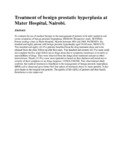| dc.contributor.author | Oliech, JS | |
| dc.date.accessioned | 2013-04-22T12:34:19Z | |
| dc.date.available | 2013-04-22T12:34:19Z | |
| dc.date.issued | 2007 | |
| dc.identifier.citation | East Afr Med J. 2007 Dec;84(12):556-60 | en |
| dc.identifier.uri | http://hinari-gw.who.int/whalecomwww.ncbi.nlm.nih.gov/whalecom0/pubmed/18402306 | |
| dc.identifier.uri | http://erepository.uonbi.ac.ke:8080/xmlui/handle/123456789/16488 | |
| dc.description.abstract | OBJECTIVE:
To evaluate the use of medical therapy in the management of patients with mild, moderate and severe symptoms of benign prostatic hyperplasia.
DESIGN:
Prospective study.
SETTING:
Private urology clinic in Mater Hospital, Nairobi between 1995 and 2005.
PATIENTS:
Six hundred and eighty patients with benign prostatic hypertrophy aged 50-80 years.
RESULTS:
Two hundred and eighty (43.8%) patients benefited from the drug treatment alone and were released from the clinic follow up after five years. Two hundred and seventy (42.2%) cases could not complete the five years follow up on drugs alone due to symptoms recurrence or severity or unavailability of drugs. They were removed from the drugs alone treatment and put on other interventions. Ninety (15.9%) cases were operated on based on their decision and insistence or severity of their symptoms or no drugs response.
CONCLUSIONS:
This observational study confirms that medical treatment is beneficial in the management of benign prostatic hyperplasia (BPH) and is cheap and gives better first line option of treatment choice to many patients. It also gives hopes to the surgical risk patients. The quality of life (QOL) of patients and their family disturbance is also improved. | en |
| dc.language.iso | en | en |
| dc.title | Treatment of benign prostatic hyperplasia at Mater Hospital, Nairobi. | en |
| dc.type | Article | en |
| local.publisher | Department of Surgery | en |

